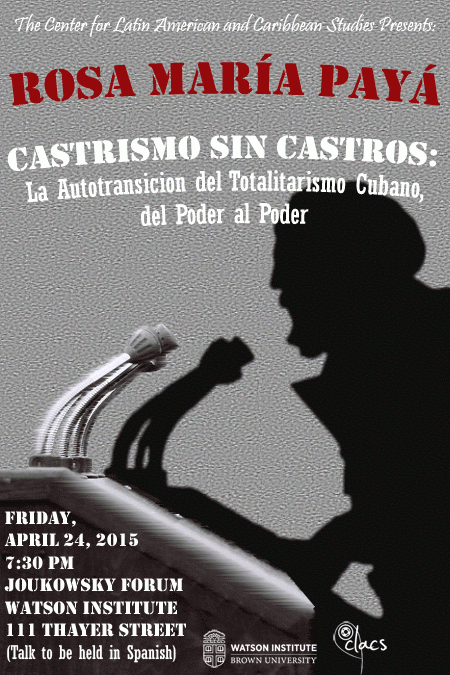Author: Rosa Maria Paya
Lia Villares’ Husband Luis Trapaga Also “Disappeared”
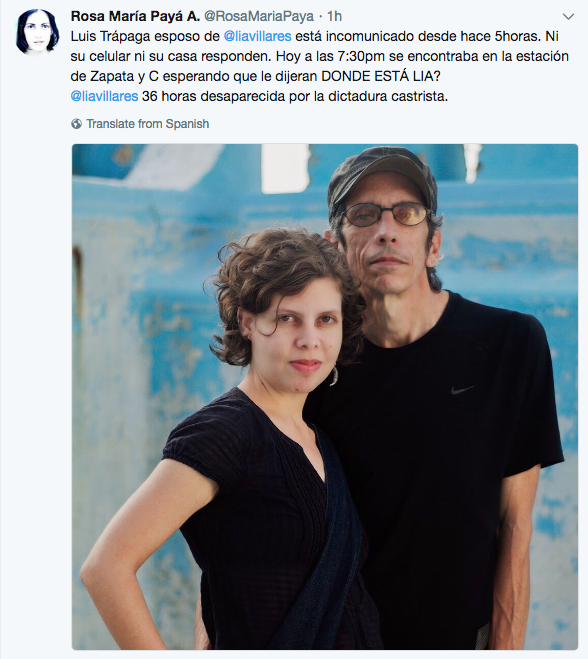
On NOT Waiting for the King to Die / Rosa María Payá
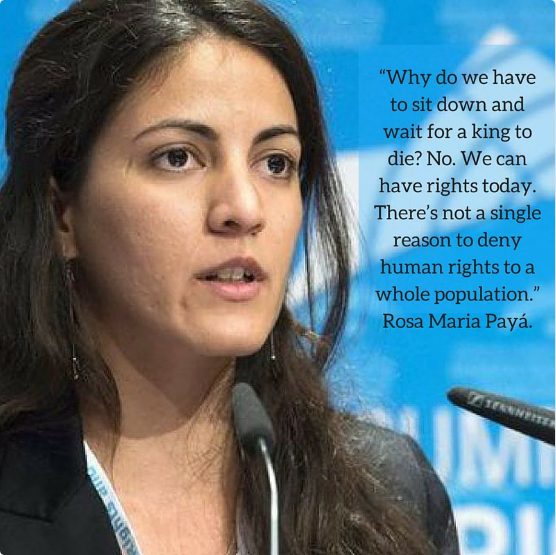
Rosa Maria Paya at the Geneva Summit for Human Rights and Democracy
Geneva Summit for Human Rights and Democracy
Tuesday February 23rd, 2016
Rosa María Payá, Christian Liberation Movement of Cuba and Latin American Youth Network for Democracy
Thank you for this opportunity to spread the voice of the Cuban people. Cubans have lived for nearly 60 years without the freedom to express our own voice. The Revolution of 1959, immediately suppressed freedom of speech, freedom of association, freedom of movement, as their totalitarian tools to remain in power forever. These suppressions came with the repression and the violence, as illustrated by the long list of extrajudicial killings perpetrated by the Cuban authorities.
In this moment, I would like to remember and honor the memory of Orlando Zapata Tamayo, dead exactly 5 years ago, during a hunger strike in a Cuban prison. My prayers are also for the 4 innocent pilots from Brothers to the Rescue, shot down in international waters by the Cuban military, on February 24, 20 years ago. continue reading
In February 2016, the same violators of human rights are still ruling on the Island. Even more dangerous, this corporative and military elite is involved in a fake transition not to democracy, but to legitimize their total control upon Cuban society, with a renewed image for the international public opinion, in order to attract foreign investors and financial credits.
This combination of the worst of communism and the worst of consumerism is leading my country to dynastic State capitalism, a “Castro-capitalism”, like my father Oswaldo Paya, warned in a book that is going to be published very soon.
It´s a system where the “historical generation” and their descendants, have monopolized all the economic resources of Cuba, while they keep sequestered the political sovereignty of our nation, condemning an entire people to the economic and social scarcity, because the absence of Human rights prevents Cubans from managing themselves.
Is this the Cuba where the European Union and the United States expect to make profits, with the justification that at some point there will be an empowerment of the civil society? This empowerment hasn’t happened, not because of a foreign policy, but because of a totalitarian state that does not recognize legal personality to any Cuban citizen, and, therefore, no one can belong to a business company or civil association or political party.
We do not believe that, what hasn´t happened in China or in Uzbekistan, is now going to happen in dictatorial Cuba.
My father, Oswaldo Payá —founding leader of the Christian Liberation Movement, and winner of the Sakharov Prize of the European Parliament—, denounced this operation of the regime as the Fraudulent Change. He paid with his life for his peaceful activism to achieve the real rights that belong to the Cuban people. On July 22, 2012, my father was extrajudicially executed by agents of the political police, together with my dear friend Harold Cepero, staging a car crash that never took place, in a location of Cuba that remains to be determined. Not satisfied with this double crime, my family was threatened to death and forced to exile, in order to carry on with more safety our lives and our struggle for a free Cuba.
But we do not belong to exile, and I refuse to remain in exile, treated as a stranger by the Cuban government and their despotic bureaucracy, including the new embassy in Washington DC, where they didn’t open the door to me.
Next Monday February 29 my father would be 64 years old. Our friends and I, in person, will be there, back in Havana in a thanksgiving mass for his life.
Death is not more powerful than Love. And the legacy of my father Oswaldo Payá and Harold Cepero is full of love for life in a free Cuba. Many Cuban lives are still in risk today. This is why we are now trying to open an independent investigation, to stop the impunity, to find out how Oswaldo Payá and Harold Cepero were murdered in Cuba.
In the summer of 2015 a special report was released by Human Rights Foundation, where all evidences indicate that this was a crime against humanity, with the involvement of Cuban authorities.
We’ll never give up on justice, because there can be no reconciliation without the recognition of the whole truth. A nation that pretends to forget the violence against its innocent people will remain a captive nation. And It will be a nation condemned to suffer such violence over and over again.
Cuba is now the country that many Cubans DO NOT want to experience. My people are selling their houses to escape through Central America, or boarding a raft to reach the United States.
But I’m not here just to tell you about our tragic history, I’m here to ask you to support the Cuban people in our struggle to change our history.
Today it is my honor to be part of the Latin American Youth Network for Democracy. We coordinate efforts in 20 countries to preserve and to rescue the democratic values that have been compromised in many parts of our continent, because of corruption, authoritarianism, and the interference of the Havana regime, as in the Venezuelan case.
So, it is time for Cubans to decide our own destiny, and to stop being the subjects of official agendas and secret pacts between governments.
It is time to put an end to the impunity of the Cuban government, which has never been chosen by Cubans in free, fair and pluralistic elections. It is time for the younger generations to assume our responsibility to build together a better Cuba.
This why more and more Cubans are now saying YES to a citizen initiative that claims for a plebiscite in Cuba, through a national and international campaign called Cuba Decide. Totalitarian and post-totalitarian systems cannot coexist with the people deciding by themselves. And this is precisely what Cuba Decide stands for, in order to initiate a true transition on the Island. Cuba must open to our own citizens, who have the right to decide the system we want to live in, after almost 60 years of unconsented government.
Cubans have the right to be asked if we want to vote, in free elections: in a safe frame for peaceful and plural political organization, with international institutions and personalities supervising the process, to avoid fraud. In this, we need all of your solidarity to spread the liberation message of Cuba Decide, and for all Cubans finally to decide our own future.
By democratizing our country we do not need to become another corrupt nation. This fatalism is another fallacy of the regime, a lie repeated by many academics from the free world.
Let me tell you that, as a young Cuban woman, me and many like me, are now struggling to live and love in a decent, inclusive, prosperous and modern 21st century society. Please, join us, in this effort to return sovereignty to the people, to give power to the people and not to the powerful. The last Iron Curtain must fall, and it must fall now!
“Freedom is indivisible, and when one man is enslaved, all men are not free”, said President John F. Kennedy in his speech at the Berlin Wall. “Dictatorships do not have political colors: they are just dictatorships”, said my father until his life was taken.
Dear friends: the Cuban people are not a monolith, to the image and likeness of the Communist Party, the only one legal according to the Constitution. In this new era of “normalization with Cuba”, the table of negotiations should contribute to a true transition and not to the interests of a General in power. We, Cubans do not need that the European Union or the United Sates solve our problems, but we need them to be coherent and to support the right to decide of the Cuban people, using all the channels available.
We are Latin Americans, but we believe in the best principles of North America too. We are Caribbean, but we stand for the best values of Europe too. We are Cubans, but we are Asians and Africans struggling for a better life. Despite the rhetoric of a reactionary regime, let’s not forget that we Cubans are no less than human. And each and every one of the universal human rights applies to us, as much as to anyone in the world.
No man is an Island. No nation is an Island. As my father used to say: help us to globalize solidarity, or human rights in Cuba will always be in danger.
God bless you all, and all our families and countries.
Thank you very much.
Free to Love, Free to Live / Rosa Maria Paya
Rosa Maria Paya, daughter of legendary Cuban democracy dissident Oswaldo Paya, calling for an international inquiry into her father’s suspicious killing by car accident. Geneva Summit for Human Rights and Democracy, Feb. 19, 2013
Rosa María Paya: Totalitarianism Does Not Tolerate Participation / Leonel Luis Leon
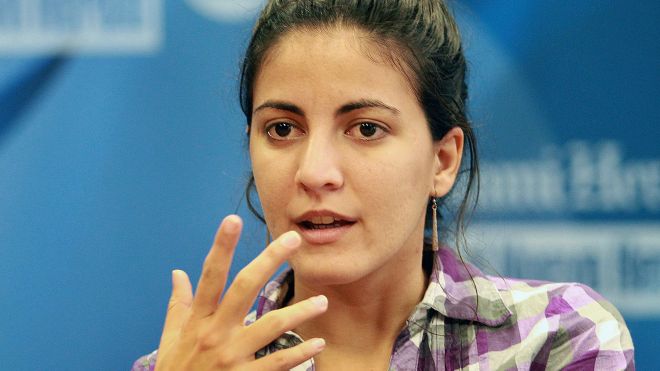
Diario Las Americas, Leonel Luis Leon, 5 December 2015 — Rosa María Payá, daughter of the deceased Cuban opposition leader Oswaldo Payá – who received the Andrei Sakharov Human Rights Prize from the European Parliament and founded the Varela Project for a citizen plebiscite in Cuba – received a major recognition of her civic activism on being elected as the new president of the Latin American Network of Youth for Democracy, whose congress was just held in Costa Rica.
In that Central American country, the young woman met with emigrating Cubans stranded there, and from there she went to Venezuela, two days before key parliamentary elections not only for Venezuela but also for Latin Americans. She spoke with Diario Las Americas about Cuba, Venezuela and the present and future of the region.
“I came to Venezuela as an independent Cuban citizen and to raise the voice of those in Cuba who also want to choose. I am also representing the Latin American Network of Youth for Democracy, whose most recent conference was just held in Costa Rica. The president of the Chilean Senate, Patricio Walker, honored me with a personal invitation to accompany him during his work in the Venezuelan parliamentary elections. I have dear friends here, many of them are young politicians and social activists working for the democratization of their country. continue reading
We have an event with Lilian Tintori, for the wrongful conviction against her husband Leopoldo Lopez and the right of our peoples to live in truth, without any government being able to hijack our freedoms with impunity. As my father said, ‘We can not, we do not know how and do not want to live without freedom.’ And young people in particular have to be supportive of this demand throughout the continent, or end up compromising our future under a sort of authoritarian alliance of the Americas,” said Payá.
This young Cuban woman is the main promoter of “Cuba Decides,” a citizen initiative for the holding of a binding plebiscite in favor of free, pluralistic and fair elections in Cuba. “Cuba Decides is not an organization, nor does it have a defined ideological perspective. For over half a century we Cubans, who are one people, have been excluded from the political, economic and social decisions made in our nation. After the violent takeover of 1 January 1959, authority in Cuba has never been legitimized by democratic elections.
“The Cuban people never chose to live without freedom. No people have ever chosen this, whenever they have been asked in a free, safe and competitive plebiscite, without state coercion or under a culture of fear imposed by the political police. Totalitarianism does not tolerate participation. The ability of such a caste to govern depends on repression at all levels against those whose opinions and initiatives differ from those of the official elite.
“Thus, the option of a referendum in Cuba that gives our voice back to Cubans – wherever we reside — is liberating, with due safeguards so that no fraud is committed: free access to debate in the national media, freedom of association, parallel counting of the vote, international observers throughout the preparatory process for the plebiscite,” she said.
Payá is convinced that only Cubans can rightfully decide on the changes needed in their society today: “And for them to be able to design a common future, they must first be guaranteed their rights by law, in an environment of trust, cordiality and inclusion respectful to all. The transition to democracy in Cuba will not start while Cubans continue to be excluded from the agenda agreed in secret between global powers, with or without the United States embargo, with or without the European Union Common Position.
“Yet to be put on the negotiating table is the key question of how we define ourselves, whether or not we are Cubans. And it is the question of showing ourselves in favor or against the right of Cubans to choose, which is the ‘right of rights’ of Cubans. ‘Changes are rights,’ my father said, ‘the people of Cuba never chose not to choose.’ Thus, it is time to ask the Cuban people, ‘Do you agree with convening free, fair and plural elections, organizing yourselves freely in political parties and social organizations with complete plurality, yes or no, at this key time?’”
The Latin American Network of Youth for Democracy is a space created by young political, social and student leaders who believe that the democratic situation in the region is so precarious that, “it requires organized action by the new generations to rescue the values of citizenship before the advance of totalitarianism, disgracefully, in most instances, instigated from Havana.
“The network has a president and now I have had the honor of being chosen, but there is also an Executive Committee and a culture of debate and participation of all members, far beyond hierarchies. From 2012 to date, the network has brought together some fifty organizations of Latin American civil society and includes young people from some twenty countries, all with the commitment to defend, strengthen and consolidate democratic institutions and the rule of law, promoting human rights and rejecting the distortion and subjugation to any group, whatever its ideological stripe.
“Being president is a commitment to all the democrats on the continent, and especially to so many generations of young Cubans who have suffered repression on the island or who have been forced into exile as a result of it.
“I think especially of my friend Harold Cepero, killed by the Cuban government when he was just 32, along with my father Oswaldo Payá, on Sunday July 22, 2012. To my dear Harold I dedicate this recognition, he could have played this role much better than I,” she said.
With regards to the evils that affect the societies of our hemisphere, Payá insisted that for many years there has been an exaggerated ‘presidentialism’, that recalls the call for ‘direct democracy’ initiated by the Castros, and this has produced an imbalance in the separation of powers appropriate to any modern democratic society. This, in turn, supports all kinds of abuses from the executive branch, such as the exceptional periods of government by decree and the lack of term limits in the top job. All this brings more corruption to the mismanagement of state resources and violations of all fundamental freedoms and human rights.
“In the Cuban case, the growing international acceptance of the norms of the repressive Cuban regime has not brought any significant change in the social and political conditions of our population. The tragedy of the Cuban people is not a problem between Cuba and the United States, and this is much more obvious since 17 December 2014, because Cubans continue in the same spiritual and material misery.
“The current immigration crisis of Cubans escaping through Central America sadly demonstrates that. Inside and outside the island we continue to be economic pariahs who are not invited to invest in and generate wealth in our own country, beyond the granting of some licenses to provide domestic services, which is the ‘consolation valve’ of ‘self-employment.’
“We lack a legal framework to behave as free and responsible citizens, and state paternalism persists unchanged, from decades back. Even those Cubans who live outside our country are subject to immigration blackmail, and those who have spent two or more consecutive years outside of Cuban have to comply with the humiliating paperwork of ‘repatriation,’ or they can never reside permanently in Cuba, something that is technically called apartheid.
“The cruelest embargo, and the one that depends only on Cubans to maintain or eliminate it, is the one maintained by the Havana regime against the rights of our citizens. Cuba has not opened in any way to its own citizens and there is no reason to trust that it will be the Cuban government that brings to pass such an opening.”
Rosa Maria Paya In Venezuela To Observe Sunday’s Legislative Elections / Diario de Cuba
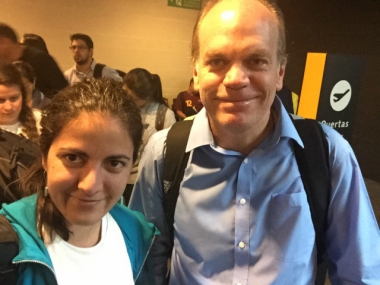
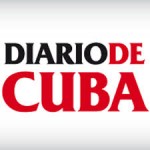 Diario de Cuba, Caracas, 4 December 2015 – The Cuban human rights activist Rosa María Payá Acevedo is in Caracas to accompany the Venezuelan youth in legislative elections on Sunday, December 6, the blogger and writer Orlando Luis Pardo Lazo reported Friday.
Diario de Cuba, Caracas, 4 December 2015 – The Cuban human rights activist Rosa María Payá Acevedo is in Caracas to accompany the Venezuelan youth in legislative elections on Sunday, December 6, the blogger and writer Orlando Luis Pardo Lazo reported Friday.
Payá, president of the Network of Latin American Youth for Democracy – a position she was elected to during the recent congress of the organization held in Costa Rica – is a representative of Cuban civil society and is in Caracas in solidarity with the youth of the country.
According to a note sent to the to Diario de Cuba’s newsroom by Pardo Lazo, Rosa María Payá Acevedo, promoter of the democratic project Cuba Decides, will observe the Venezuelan legislative elections as a guest of honor of the Chilean Senator Patricio Walker, with whom she flew to Caracas.
Je Suis Cuba / Rosa Maria Paya Acevedo

Diario de Cuba, Rosa Maria Paya Acevedo, 15 November 2015 — Two years ago in Paris, at exactly this time, I had the satisfaction of meeting in person a renowned Cuban writer who lives there. I was there only a few days and travelled little around the city. They were days of work, meetings and interviews before flying to Strasbourg, to attend the Sakharov Prize ceremony for the child activist Malala Yousafzai, who had suffered an assassination attempt at the hands of the Pakistani Taliban in an attack that shocked the world.
I remember that at the foot of the most famous tour in the world all the languages I could hear echoing. I imagine that this is the sound of freedom of movement. Something thousands of Cubans have not had, Cubans who escape the island on rafts, ready to die and in many cases dying in the sea. The same freedom of movement that made possible the terror in the City of Light this Friday, when eight boys started shooting dozens of other boys. continue reading
I know what this is, I have lived it. The families of the more than 120 fatally wounded victims will never recover. This November it will not be easy for the French people to overcome this. Like the Christian refugees, who have been lucky enough to escape the ethnic cleansing occurring in the Middle East with less media coverage, will not return to their countries.
And again it is repeated: attacks on human dignity are no longer circumscribed by geographical boundaries, call it jihadism or the Castros’ totalitarianism. Terror has shown the power to cross the Mediterranean, like authoritarianism is reproducing in Latin America.
I fear that the crime that took the life of the young activist Harold Cepero on a Cuban highway should warn us of the deaths of teenagers on the streets of Caracas two years later.
Solidarity is no longer a question of altruism but of survival. We do not ask for whom the bell tolls. As in Paris and so in Havana, it tolls for all of us.
“I come to my country because it is my right” — Rosa Maria Paya / Cubanet, Ignacio Gonzalez and Osmel Almaguer
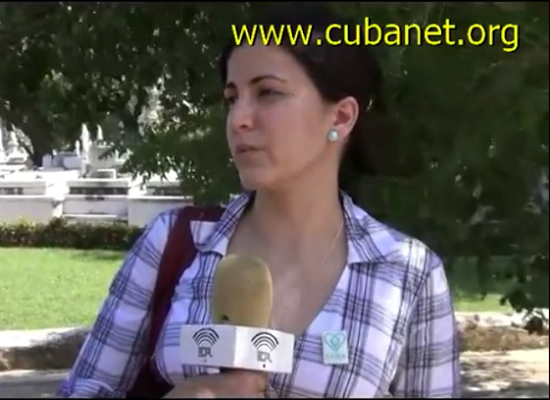
 Cubanet, Ignacio González and Osmel Almaguer, Havana, 11 May 2015 — Rosa María Payá, daughter of the late fighter for human rights in Cuba, Oswaldo Paya, arrived in Havana on Monday morning, from the Miami airport, in order to reunite with family and friends and to honor the memory of the father.
Cubanet, Ignacio González and Osmel Almaguer, Havana, 11 May 2015 — Rosa María Payá, daughter of the late fighter for human rights in Cuba, Oswaldo Paya, arrived in Havana on Monday morning, from the Miami airport, in order to reunite with family and friends and to honor the memory of the father.
The daughter of the important fighter, who traveled to her homeland in the company of other activists, commented on the military presence in the “José Martí” National Airport, which is, according to his fellow passengers, an anomaly.
She also said she does not know the length of her stay and must take care of some legal paperwork before her return.
“I come to my country because that is my right as it is the right of all Cubans, whether or not it is recognized in the law. I think we have a unique opportunity as Cubans to work for our welfare, taking the risks to work to win our rights,” she said. continue reading
Rosa Maria kindly agreed to answer some questions for this team of reporters, and thanked those who support her cause, and the importance of the legacy of her father:
“My greatest thanks to the people who have accompanied me on my return to my country, to the people who have electronically sent flowers to honor the memory of my father. We have many friends and Cubans who want to honor the memory of Oswaldo Paya, and emphasize that his legacy is still relevant.”
Oswaldo Paya was one of the founders of the Christian Liberation Movement, created in 1988 with the aim of fighting for the human and civil rights of Cubans. He is known worldwide for his intention to run for deputy to the National Assembly of People’s Power, and in 1997 achieved hundreds of signatures supporting his candidacy.
He also co-founded the Varela Project in 1998, which pursued collecting over 10,000 signatures to present to the government asking for for changes in legislation through a national referendum. For this work, he received the prestigious Andrei Sakharov Prize for Human Rights from the European Parliament in 2002.
His death took place in dubious circumstances and there is currently an ongoing investigation, pushed by Rosa Maria, to confirm suspicions about the possible involvement of State Security in his death.
The video accompanying this article is in Spanish:
Rosa María Payá ─ Castroism After Castro: Cuba Totalitarian Self-Transition, From Power to Power: Watch (un)Live
Ask the People / Rosa Maria Paya
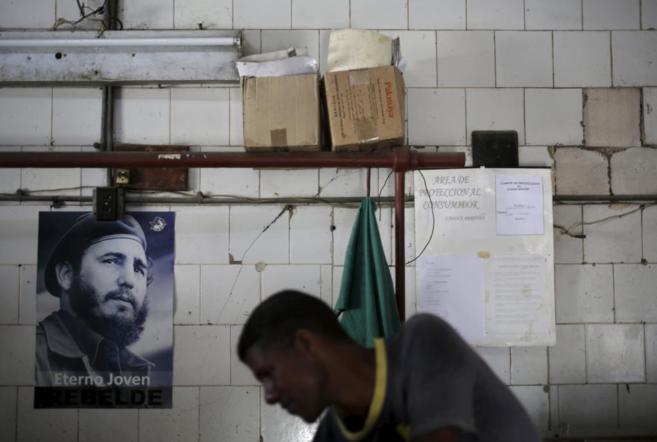
El Mundo, Rosa Maria Paya Acevedo, 12 April 2015 – Although the current Summit of the Americas in Panama has been a blackboard where the peoples of the Americas have been forced – once again – to choke on the barbarian mouthful of that old subject that is Cuban totalitarianism, hope is renewed by the attitude of consistency and solidarity assumed by the diverse civil society of the Americas.
Today in Cuba a self-transition from Power to Power is being cooked up, which tries to ignore the will of the Cuban people and its exile, while enthroning the military elite after a masquerade of reforms which decriminalize certain economic concessions but continue to hijack all the rights of the citizenry.
Since landing in the sister nation of Panama, I have re-experienced firsthand repression in the style of the Cuban regime. The sincere apologies of the Panamanian Foreign Ministry lose force in the face of all the abuses it allowed to take place against the independent civil society of Cuba and all of the Americas. continue reading
Only Cuban civil society activists and the foreigners who work with us were threatened and detained in Panama. But there were no consequences for Cuban State Security agents – such as Alexis Alfonso Frutos Weeden – who beat their peaceful countrymen openly in the street, simply for thinking that our beloved Cuban deserves, after more than half a century without plural elections, an alternative to totalitarianism. Similarly, these agents boycotted the discussion tables of civil society and beat accredited foreigners.
As on the Island in Panama as well: the Cuban opposition has been found a priori guilty in the eyes of authority. The marvelous-real isthmus thus turned into the magically-repressive. Hence, we civil society members elevate our demand for democracy in Latin America to the Organization of American States, in hopes of catching less indolent ears than those of the OAS’s outgoing secretary general.
However, the documents read in the plenary session at the end were indeed the consensus of the civil society of all of the Americas. The regime’s rudeness did not serve it well, as before the intolerant cry of “There will be no Forum,” the consistent voice of Latin American civil society was raised, supporting the implementation of “binding mechanisms for consulting the citizenry, such as plebiscites and referendums.”
Civil society forged networks to demand a life in truth. We young Latin Americans refuse to be subjects of alliances and hegemonies which, with a rhetoric more or less revolutionary, claim the lives of Venezuelan or Mexican students, gag the press in Nicaragua or in Ecuador, and condemn Cubans to a dynastic totalitarianism in perpetuity.
As my father Oswaldo Paya said so many times before his extrajudicial execution in Cuba on Sunday, 22 July 2012: dictatorships are not of the left of the right: they are just dictatorships. Because rights have no political color, no race, no culture. Because the dignity of the human person in an inalienable gift far beyond the markets and the State.
For this reason we are now working on the citizen initiative Cuba Decides, which proposes holding a plebiscite, which we presented in the parallel summits and in the Civil Society Forum in Panama. After decades of dictatorship, the Cuban government does not represent the people. Nor do we pretend to speak for all Cubans, but we do want the Cuban people to have a voice.
The world’s democracies have the opportunity today to pay less media homage to handshakes between the elected president of the White House and the hereditary general of the Plaza of the Revolution, and to prioritize the agenda of accompanying Cubans in our liberation, asking the people in a plebiscite to return to us our sovereignty.
Translated from the original Spanish published in El Mundo.
Cuba Decides: Continuing Oswaldo Paya’s Work for a Plebiscite
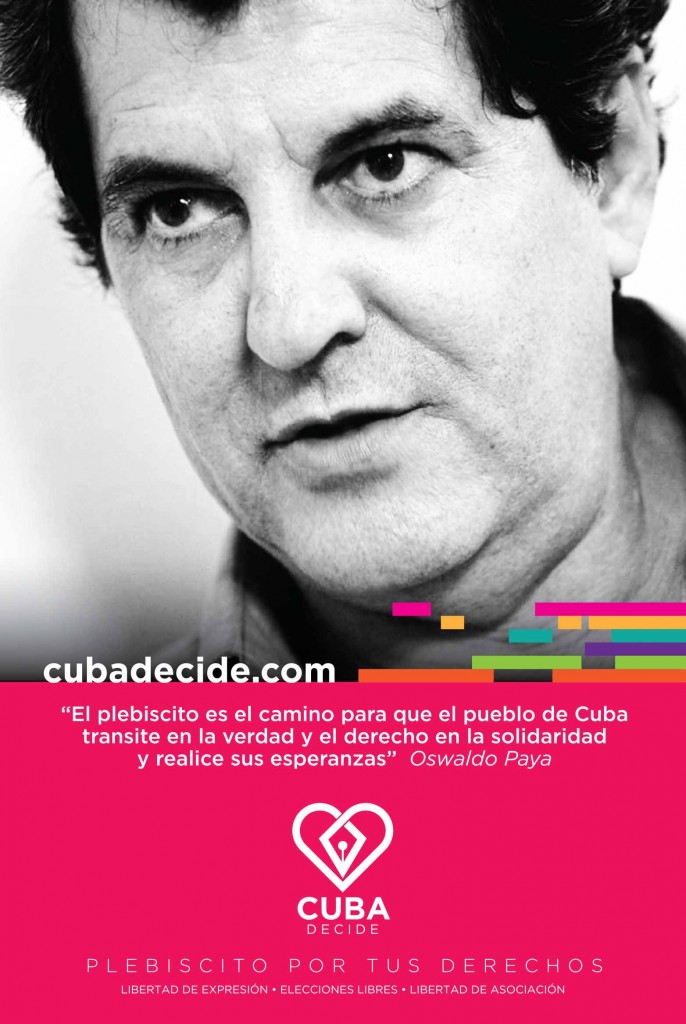
For over half a century Cubans have been excluded from the political, economic and social decisions made in our nation. The group in power in Cuba has never been legitimized by democratic elections. The government is responsible for the repression and violence against those with opinions and alternative initiatives.
The absence of an environment of law and self-determination, has plunged the people into poverty and has led our country to economic and social failure, accompanied by constant mass exodus of its citizens.
We are aware that only Cubans corresponds us to define and decide on the changes needed in our society and so do our national project. But for citizens to design, approve and build their future, must be guaranteed by law rights and an atmosphere of trust and respect for all achieved. continue reading
In this way we can make a genuine national dialogue and begin the process of legal changes, without exception, for the people to retain or sovereignly change that decision. So proclaim and work for the people to be consulted in a plebiscite. There will be no transition to democracy in Cuba if Cubans are again excluded.
Our proposal continues the citizen petition the Varela Project. Bill that 25,404 Cubans with voting rights submitted to the National Assembly of People’s Power, supported by article 63 of the Constitution of the Republic. The National Assembly has yet to respond to these citizens.
Our demand considers Articles 19, 20 and 21 of the Universal Declaration of Human Rights. The Cuban state as one of its signatories committed themselves to achieve, in cooperation with the United Nations, the effective universal respect for human rights and fundamental freedoms.
The Cubans are one people. All, without classify and divide them by their ideas, beliefs, race, political positions or country of residence, are called to promote and participate in this plebiscite.
No one should question the changes that the people want is freedom, reconciliation and all rights. For these goals and work peacefully fight the opposition inside and outside Cuba. But the great lack of Cubans is that we have no voice, no democratic means to express ourselves as the government and some in the world claim to speak for our people. Hence our demand to the government of Cuba, is to conduct a plebiscite for the people to express itself supremely 1 and decide on the following proposal:
Are you in agreement with that free elections held shall exercise the freedom of expression and Press and organizing freely in political parties and social organizations with full plurality? Yes or No?
Urging all Cubans wherever they are to join this lawsuit. We invite governments, the democratic institutions and the men and women of good will in the world to support the sovereignty and self-determination of our people, which is to support the right to decide for Cubans, through a plebiscite.
Rosa Maria Paya For the Future of All Cubans Without Castro
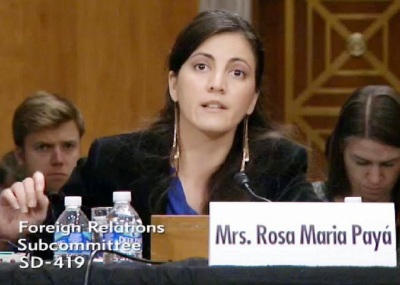 In recent years my country has been engaged in a deception. The Cuban government is changing the Law, but ignoring the rights of the people, which were sequestered over half a century ago.
In recent years my country has been engaged in a deception. The Cuban government is changing the Law, but ignoring the rights of the people, which were sequestered over half a century ago.
More people are allowed to enter and leave the country, but the regime decides who can enjoy this “privilege”. The migratory reform was established as a control mechanism. For example, the government has invalidated the passport of the artist Tania Bruguera for attempting a performance in Havana. Sonia Garro, a member of the Ladies in White, and one of the political prisoners released during the Washington-Havana secret deal, cannot travel abroad and thus she is still continue reading
a hostage of the government, as Alan Gross was for 5 years. The same applies to the former prisoners of the Cause of the 75 from the spring of 2003.
The Cuban government has permitted more people to operate small businesses, but due to the Cuban laws, entrepreneurs cannot be a factor to foster democracy because their existence as “private” owners depends on their submission to the government. There cannot be free markets where there are no free persons.
The Cuban government said it would free 53 political prisoners, but instead it released them on parole. Meanwhile, many others were not freed at all. Yosvani Melchor was transferred to a maximum security prison last December. He was put in prison 4 years ago for being the son of a member of the Christian Liberation Movement, who refused to cooperate with State Security. The young artist Danilo Maldonado, known as El Sexto, was imprisoned after December 17 without committing any crime. The regime turns political prisoners into pieces to be exchanged, because they can catch-and-release at will more political prisoners, and democratic nations accept this blackmail with innocent citizens.
As my father did, four months before he was killed, I denounce the regime’s attempt to impose a fraudulent change, and I denounce the interests that hamper a real transition and the recovery of our sovereignty. My father also denounced the attempt to link groups of exiles to this fraudulent change. He said, “The diaspora is the diaspora because they are Cuban exiles to whom the regime denied all rights, as they do to all Cubans. In such a context of oppression, without rights and without transparency, the insertion of the diaspora would only be part of the fraudulent changes.” As the engagement would be fraudulent, if the United States were to accept the rule of the Cuban government. We have never asked our people to be isolated or embargoed, but engagement will only be real if it occurs between free peoples.
We urge you to truly open up to Cuba, but to advance a helping hand is essential the solidarity with the Cuban citizenry. It is essential to support the peaceful and legal changes that thousands of Cubans have presented to their fellow citizens and to the Cuban Parliament, an alternative that allows our people to decide their own future.
There is no respect for the self-determination of the Cuban people when negotiations are a secret pact between elites, or when there is no mention that the Cubans can participate or be represented in their own society.
I know that the US Congress and the Administration will do what you think is best for this country, which has served as refuge for nearly 20% of our population. But only a real transition to democracy in Cuba can guarantee stability for the hemisphere. We the Cubans are not Chinese, we are not Vietnamese, and we definitely won’t accept a Putin-like model towards despotism.
The strategy to prevent a mass exodus from Cuba is not by saving the interests of the group now in control, this is an unstable equilibrium that could end in more social chaos and violence. In fact, this country is already facing a Cuban migratory crisis, despite the record numbers of US visas granted. More than 6,500 Cubans arrived in the United States via the Mexican border since last October, and more than 17,000 did so in the previous year. With or without the Cuban Adjustment Act, this situation will get worse because of the attempts of those in power in Cuba for self-preservation of the status quo.
We Cubans want real changes, to design the prosperous country that we deserve and can build. The only violence here comes from the Cuban military against Cubans, that’s why the solution is a peaceful transition, not an appeasement.
The way that you can promote stability in the region is through supporting strategies that engage the popular will, to reach the end of totalitarianism with dignity for everyone. You have the opportunity to support the petition for a constitutional plebiscite in favor of multi-party and free elections, already signed by thousands of citizens in the Varela Project, as is allowed for the Cuban constitution. There is an active campaign by Cubans from all over the globe, asking for rights for all Cubans and the Plebiscite, which is a first vote for the long-lasting changes that Cuba needs.
On 22 July 2012, Cuban State Security detained the car in which my father, Oswaldo Payá, and my friend Harold Cepero, along with two young European politicians, were traveling. All of them survived, but my father disappeared for hours only to reappear dead, in the hospital in which Harold would die without medical attention.
The Cuban government wouldn’t have dared to carry out its death threats against my father if the US government and the democratic world had been showing solidarity. If you turn your face, impunity rages. While you slept, the regime was conceiving their cleansing of the pro-democracy leaders to come. While you sleep, a second generation of dictators is planning with impunity their next crimes.
That is why we hope that this Congress demands that the petition for an independent investigation, regarding the attack against Oswaldo Paya and Harold Cepero, be included in the negotiations with the Cuban government, and that we hear publicly what response is given to this point. Knowing the whole truth is essential in any transition process, and to tolerate impunity is to endanger the lives of all Cubans wherever we live.
Don’t turn your backs on Cubans again; don’t earn the distrust of the new actors of our inevitably free future, in exchange for complicity with a gerontocracy who belongs to the Cold War era.
I want to conclude with the words my father wrote to President Obama 5 years ago:
“Your government must move forward and extend a hand to the people and government of Cuba, but with the request that the hands of Cuban citizens not be tied. Otherwise, the opening will only be for the Cuban government, and will be another episode of an international spectacle full of hypocrisy. A spectacle that reinforces oppression, and plunges the Cuban people deeper into the lie and total defenselessness, seriously damaging the desire of Cubans for the inevitable changes to be achieved peacefully. The pursuit of friendship between the United States of America and Cuba is inseparable from the pursuit of liberty. We want to be free and be friends.”
God bless and protect our peoples.
Thank you.
Rosa María Payá Acevedo
3 February 2015
Original in English
Rosa Maria Paya for Cuban Human Rights
24 January 2015
Rosa Maria Paya Speaking to UN Watch / Rosa Maria Paya
Remarks of human rights advocate Rosa Maria Payá on why Cuba should not be elected to the UN Rights Council, delivered at UN headquarters on November 4, 2013, at a press conference organized by UN Watch and the Human Rights Foundation.
Transcript:
On September 20, the Cuban government declared, in the Human Rights Council, that they would not allow democracy in my country. They reject democratic values, and they pretend to redefine them with twisted principles, in order to remain in power forever.
The Cuban mission declined all recommendations to stop political apartheid, and to ensure fundamental freedoms, among many rights requested by the Cuban people from the government.
My father Oswaldo Payá is the founder of the Christian Liberation Movement [MCL]. He won the Sakharov Prize from the European Parliament, and he struggled peacefully for the recognition, in law and practice, of the right of all Cubans to have rights. He promoted a referendum known as the Varela Project, which has the support of more than 25,000 citizens, more than the number requested by our Constitution. Ten years later, the Cuban government still refuses to answer this citizen call for a plebiscite, violating its own Constitution.
My father died last year, and it is known that cars from the Cuban State Security were chasing him, and that his car was pushed out of the highway. World leaders have demanded an independent investigation after the contradictory version given by the Cuban government, whose UN mission refused to allow this investigation, as requested during the last UPR.
How come the Cuban government belongs to the Human Rights Council, when they systematically abuse those who demand real changes, when they do not allow any investigation of extrajudicial crimes in which they could be involved?
When they abolished university autonomy, religious freedoms, freedom of movement, association and publication, while they took control of all mass media, in a nation where the most part of the people do not know Internet because it is not a right?
When they don´t respect property rights, nor the right to a free economy, only to promote now a fake reform that doesn´t guarantee the rights of Cuban workers, nor even the rights of the foreign investors?
How come the Cuban government is in the Human Rights Council, when their leaders transfer power dynastically, when during the last 64 years there have never been free elections in Cuba, they have never been subject to an effective popular vote, thus being illegitimate to represent us?
When they mock of the international community as they present themselves as victims before UN, while they traffic tons of weapons and explosives in a civil ship, violating UN´s resolutions about North Korea, and endangering many lives?
When they are the same military that shot thousands of Cubans from the beginning of the Revolution, who promoted armed movements in Latin America, who sank at sea the tug-boat “13 de Marzo” loaded with women and children, who murdered four civil pilots of the “Brothers to the Rescue” organization in international water, who imprisoned and deported most of the Varela Project leaders, who mistreat the activists of the Ladies in White movement, who have been in prison the young Yosvani Melchor for over 3 years just for being the child of an active member of the MCL, who threatened to death my father, my family, the members of the Christian Liberation Movement and many other dissident leaders, who split apart most of the Cuban families with their intolerance?
How can they belong to the Human Rights Council, when it´s the Cuba government the one that kidnap our nation’s sovereignty?
The presence in the Human Rights Council of the Chinese, the Russian, the Saudi and the Cuban regimes, is disappointing for the victims of repression, and it sends a message of complicity from the international community. Cubans know that we are responsible to lead our country towards a democratic transition, but this is a time for solidarity, and democratic governments should not share seats with criminals, which behave with impunity, since they are not suffering any consequence for their violations.
These are defining moments for my nation. It’s time to pressure the Cuban government to behave democratically, or, in defect, not to elect Cuba for the Human Rights Council, in order to preserve the legitimacy of United Nations.
Against democracy there are many economic and political interests, including those who defend a supposed stability, over a real peace based on universal rights. It is difficult to ignore lobbies and the power behind lobbies. But, to defend the values for which it was created, the Human Rights Council has two choices: 1) to ignore that the sovereignty of the Cuban people is kidnapped; or 2) to defend the values that are the basis of United Nations, claiming respect for the democratic demands of all Cubans, therefore defending citizen rights in all nations.
God help us all.
Thank you very much.

